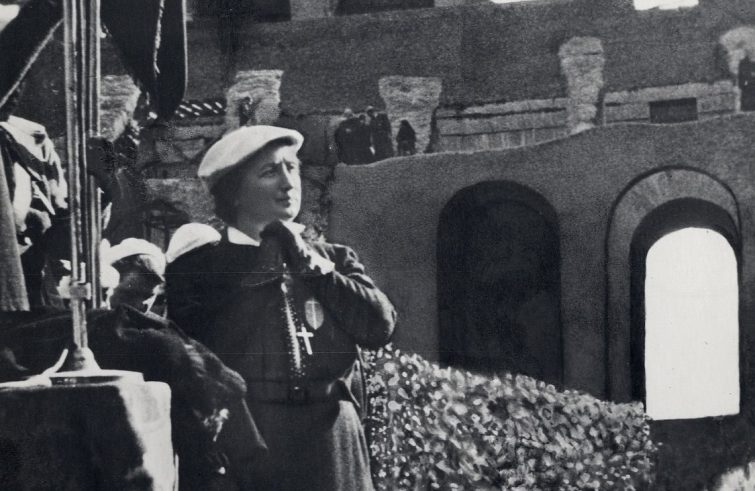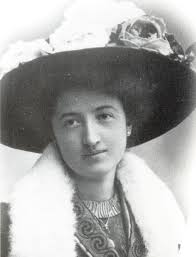
An evocative “journey” amidst the most significant places in the city of Milan to promote the biography and spirituality of Armida Barelli, due to be beatified on April 30th, in Milan’s cathedral, together with Fr Mario Ciceri. In his book “Armida Barelli da Milano al mondo, Protagonista al femminile di una società in trasformazione (In dialogo Ed.s)”, Luca Diliberto analyses “her intense life, with its wealth of encounters and projects, which never refrained from facing challenges aimed at bringing the Good News of the Gospel into the heart of the new twentieth-century society.”
 Professor Diliberto, the title of your book highlights the bond between Armida Barelli and the city of Milan. Is it such a significant aspect?
Professor Diliberto, the title of your book highlights the bond between Armida Barelli and the city of Milan. Is it such a significant aspect?
It can be safely said that dedicating particular attention to the city in which she was born and where she lived for a long time, together with the reality of Lombard Catholicism that to some extent shaped her life, was felt very strongly by those who asked me to write her biography about a year ago: the Diocese of Milan, Catholic Action, the publishing house. However, this is not a digression. In fact, quite the contrary: it is the vital context that saw her pursue the distinctive features of her vocation and then bravely work towards serving extraordinary apostolic works – in short, Milan at the beginning of the twentieth century was really something special. It should not be overlooked, but rather deserves being remembered. The opposite approach is also important, i.e. identifying in the story of Armida Barelli those characteristics that, rightly or wrongly, we identify with this city and its residents: industriousness, entrepreneurial spirit, openness to novelty. In fact, all these aspects are present in her commitment, which to a great extent led to the creation, together with Father Gemelli, of a previously unprecedented university, and of an educational institution such as the Girls Youth movement, under the auspices of a saintly bishop like Cardinal Ferrari.
Rooted in the local context, but not restricted to it.
Definitely not. This was clearly due to her education (she studied in Switzerland, at a prestigious boarding school for girls), thanks to which she was proficient in both French and German and had a good command of English. In was not very common in her time, in general and particularly for a young girl, albeit wellborn. Furthermore, she had a natural disposition to understand the realities extending beyond her own ( for instance, the liturgical or charitable experience on the other side of the Alps) and was open to bearing witness to the faith wherever needed. She travelled extensively, frequently in difficult conditions, especially in Italy, where she was confronted with diverse social realities and sought to find the appropriate resources to deal with situations that were not only geographically but also culturally out of touch in the 1920s.
Through her efforts, she gave a national, unitary dimension to a large movement of young women – far more stable and lasting than the patriotic rhetoric that sustained Fascism.
Finally, it should be remembered, within the scope of the initiatives undertaken by the National Girls Youth, that she was involved in a mission to China. In fact, for her, the world had no borders.
 Let us focus on her efforts concerning young women.
Let us focus on her efforts concerning young women.
In the early 20th century, the women’s movement in the Italian Church was in its early stages, and it was mostly characterised by women from a high – if not noble – social class. It was also regarded with suspicion by many, who preferred a subordinate role for women, confined to domestic duties. The greatest strength of the National Girls Youth lay in fostering a leading role in all areas, in ecclesial and civil life alike, in encouraging young women to go out of their homes, so they might acknowledge their inherent roots as something good and not as beholden to the male universe, namely their baptismal dignity, and to promote their strong apostolic commitment. Armida Barelli’s message, which she bore witness to in many encounters, was: take your existence into your own hands, do not allow others to decide it for you, because God knows the value of each and every one of you.
To this was linked her focus on vocations, as well as her ability to form a network, an affective and tangible ‘sisterhood’, capable of bridging social divides, of inspiring the study of the foundations of the faith and social issues.
During the arduous, often bitter, confrontation with Fascism (and its youth organisations), she managed to safeguard this specific identity, nourishing a truly impressive journey in terms of objectives and instruments.
 Is there a secret behind this tremendous commitment?
Is there a secret behind this tremendous commitment?
Identifying it is easy, but it is perhaps less easy to describe the full extent of it. The secret resides in her faith, in the fact that she took the Gospel seriously, in her desire to find the most suitable way to serve God in her own time, among the people, in organisations and institutions. This feature of hers of total self-giving is clearly evident, as she gave up the comforts of a affluent family, subjecting herself to many hardships owing to her physical condition, which was tried by serious illnesses… Many people were touched by this, in her circle of friends and among those who met her through her apostolic work. The Sacred Heart, which she described as a lifelong ‘talisman’, was a welcomed presence from an early age, ever present in her daily life imbued with meaning. She gladly believed in and put everything at the service of this ideal. Still today, whoever learns of her life is impressed by her utter dedication, but also by her happiness at having embraced the faith, both in the good times and in the hard times, which she experienced even during her deeply fulfilled life.









